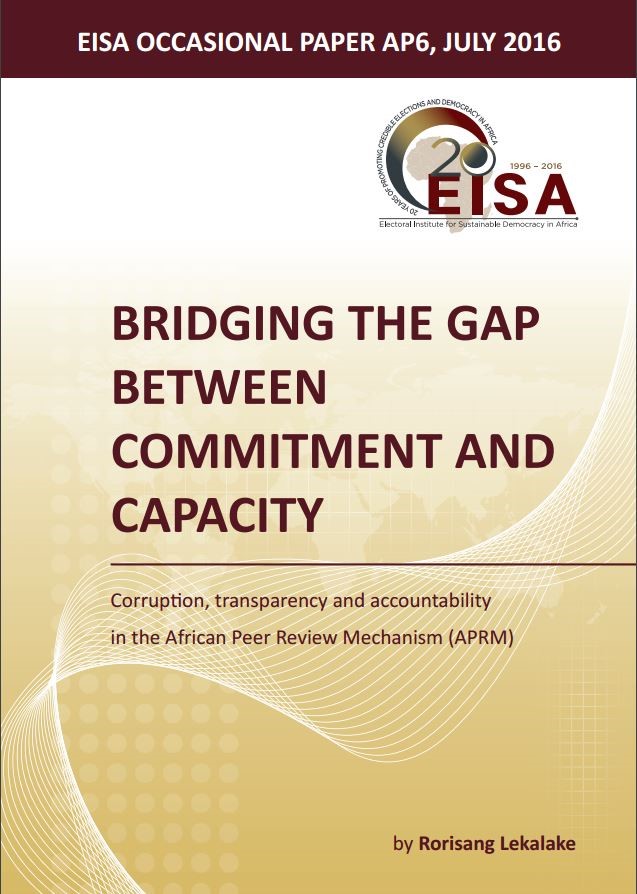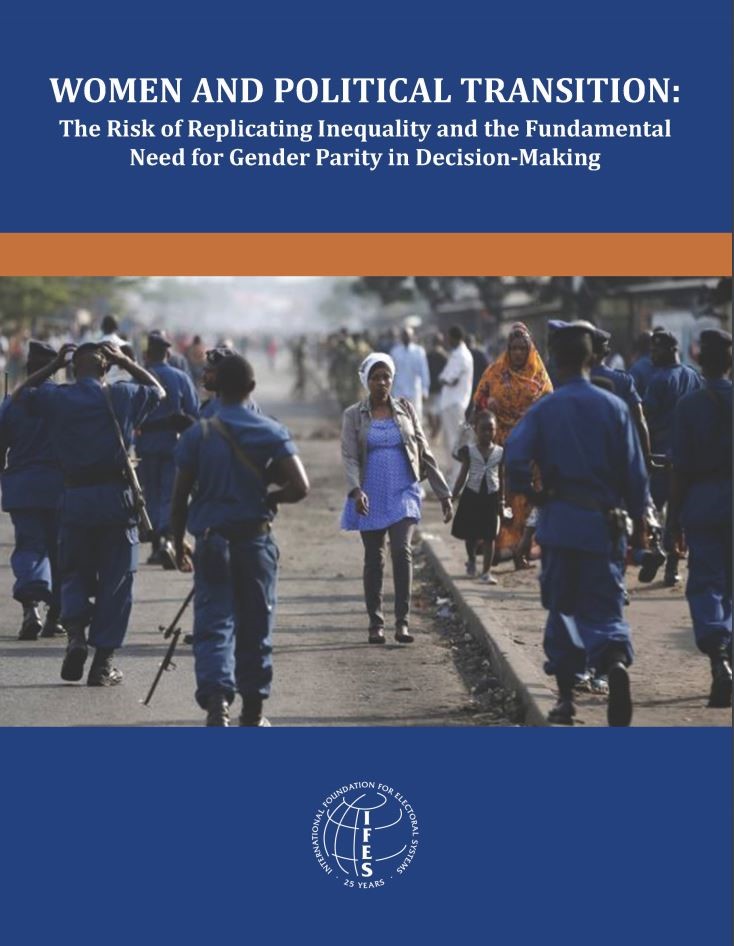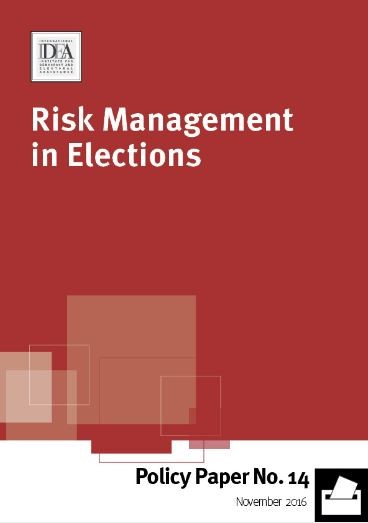ACE Updates February 2017

|

Dear readers, We hope your 2017 is off to a good start! This edition of the ACE Newsletter features a chapter summary from an American Bar Association (ABA) publication entitled International Election Remedies. The authors from our partner organization, the International Foundation for Electoral Systems (IFES), discuss the importance of providing the right to a remedy when electoral rights are violated and elucidate key elements that make such a remedy “effective”. The February 2017 edition of the ACE Newsletter further highlights:
The ACE Electoral Knowledge Network promotes credible and transparent electoral processes with an emphasis on sustainability, professionalism, and trust in the electoral process. ACE offers a wide range of services related to electoral knowledge, assistance, and capacity development. Thank you for reading February’s newsletter and for your involvement with ACE. We look forward to your contributions to the Network! Best regards, The ACE Electoral Knowledge Network This newsletter is also available in PDF format.
Feature: What Constitutes ‘Effective’ Remedies to Electoral Grievances?Katherine Ellena and Chad Vickery, International Foundation for Electoral Systems
Where there is a right, there must be a remedy[1]The right to an effective remedy is well established in international law, and stems from the fundamental rights of political participation and universal suffrage. It is the violation of these rights – intentional or otherwise – that necessitates a remedy to restore them. Election experts from the International Foundation for Electoral Systems (IFES) were recently invited to contribute four chapters to a publication of the American Bar Association’s (ABA) Standing Committee on Election Law, entitled International Election Remedies, published in November 2016. In the book, IFES Senior Legal Specialist, Katherine Ellena, and Director of the Center for Applied Research and Learning, Chad Vickery, note that election observers frequently identify the failure to provide effective remedies as a key weakness in the electoral process, but it is not clear what constitutes an “effective” remedy. Further research is needed on just how the efficacy of different remedies might be better measured – and ultimately their application better refined.
What is being remedied?Effective remedies are needed to respond to mistakes and violations by different actors throughout the electoral cycle that may cast doubt on the integrity of the process itself. One approach used by IFES to analyze challenges to the integrity of the election process distinguishes between violations related to systemic manipulation, malpractice, and fraud.[2] One key benefit of integrity distinctions is that they can help identify appropriate remedies depending on the type of vulnerability identified – for example the remedy for a procedural mistake will be different than for intentional fraud.
Who is the remedy for?The effectiveness of a remedy depends in part on the parties that it affects. Whose rights have been violated? Who can bring a complaint or appeal against the violation? Is there broader public interest in a particular remedy? In principle, all actors who assert knowledge of an electoral irregularity should have legal standing to bring complaints, regardless of injury.[3] Conversely, a principle of broad legal standing can lead to burdensome caseloads and increase the number of frivolous claims, which can undermine the efficiency of electoral dispute resolution (EDR) systems.[4] Ultimately, the legal framework must find the right balance in terms of who can file a complaint to ensure that the legal system has the capacity to properly investigate and adjudicate legitimate claims in a timely and effective manner.
What are the core elements of effectiveness?There are arguably several core elements comprising the concept of “effectiveness,” and these elements concern both the effectiveness of the election dispute resolution system itself and the actual remedies the system produces: A remedy must be effective in practice as well as in law Even when the right to a remedy resides in the legal framework, access to an effective remedy may remain elusive. In Petkov v. Bulgaria, the European Court of Human Rights (ECtHR) ruled that a remedy must be “effective in practice as well as in law in the sense either of preventing the alleged violation or remedying the impugned state of affairs, or of providing adequate redress for any violation that has already occurred.”[5] While it is important for remedies to be clearly set out in the legal framework, the application of these remedies must also be guaranteed: “winning the case is not the same as winning the remedy.”[6] A remedy must be timely It is crucial to resolve disputes or violations in a timely manner while they can still be redressed in a meaningful way. If the public considers the settlement of disputes too slow, trust in the EMB and judicial institutions (and ultimately in the results of an election) may be lost. In Nigeria, for example, the court system took nearly two years to resolve a dispute regarding the 2007 election, with a rerun finally ordered in 2009 after the declared winner had spent two years in office.[7] The need for the prompt resolution of electoral issues must also be balanced with the requirement for due process. In Namat Alieyev v. Azerbaijan, the ECtHR held that time restraints “may not serve to undermine the effectiveness of the appeal procedure.”[8] A remedy should be proportional to the violation While irregularities often have relatively minor consequences and do not amount to violation of any fundamental human right, election contestants should not be permitted to flout the law with impunity.[9] Rather, remedies for these violations should be proportionate to the harm caused. The availability of a range of remedies is necessary to ensure proportionality of the sanctioning system. Fines are particularly conducive to proportionality, since they can easily be varied from a small amount that is more symbolic in nature to a more substantial amount that can curb the activities of political actors.[10] To ensure proportionality, one must consider the regularity of the violation, the impact of the violation on the process, what will correct the issue, and what deterrence is required to ensure others do not repeat the illegal act or careless mistake. A remedy must be enforceable A lack of proper enforcement can undermine the right to an effective remedy and must be addressed if the EDR process – and the electoral process as a whole – is to be respected by the electorate and if electoral and judicial institutions are to be seen as legitimate. In Petkov v. Bulgaria the ECtHR stressed that the “rule of law…entails a duty on the part of the State and public authorities to comply with judicial orders or decisions against them.”[11] The enforcement of remedies and sanctions is important not only to give substance to rights, but also to deter future instances of malpractice and fraud. A remedy should be effective in deterrence An effective remedy implies the availability of sanctions and penalties, such as decertifying a candidate, disqualifying a political party, suspending the right to campaign, invalidating a ballot, or ordering a recount.[12] To effectively deter, the availability and application of sanctions must be known. Without clear procedures and publication of resolutions or remedies, the deterrence value decreases. Beyond these clarity and transparency measures, penalties or sanctions must be sufficiently strict to deter each different kind of violation, and sanctions will be more effective in deterrence if all parties engaged in a violation are penalized.[13] A remedy should reinforce the perception of fairness and the credibility of the process Finally, effective remedies are essential for undergirding the credibility of the electoral process. Research focused on the effectiveness of institutions suggests that people largely react to the fairness by which authorities make decisions and exercise authority, and that these reactions “shape both their willingness to accept decisions and their everyday rule-following behavior.”[14] Citizens must believe the will of the voter is ultimately reflected in the election result, and that losing candidates have a right to redress via an effective dispute resolution process that considers all legitimate complaints. For further information on this publication or to purchase a hardcopy, please contact Elizabeth Yang at [email protected] or Katherine Ellena at [email protected].
[1] William Blackstone, Commentaries on the Laws of England 23 (1768). [2] Chad Vickery & Erica Shein, Assessing Electoral Fraud in New Democracies: Refining the Vocabulary, in IFES White Paper 9 (2012). [3] Guidelines for Understanding, Adjudicating, and Resolving Disputes in Elections [GUARDE] (Chad Vickery ed., 2011), 21. [4] A case can be made that exceptions to ordinary rules on standing are justified with regard to certain types of grievances. See Carter Center, Electoral Resolution Experts’ Meeting 2, 10 (2009). [5] Petkov v. Bulgaria, Nos. 77568/01, 178/02, & 505/02, 5 Eur. Ct. H.R. ¶ 74 (2009). [6] Miyagawa v. Peru, Case 11.28, Rep. No. 119/99, Inter-Am. Comm. H.R. doc. 3 rev. ¶ 1262 (Oct. 6, 1999). [7] This provision of the electoral law recalls section 294(1) of the Nigerian Constitution, that “every court established under this Constitution shall deliver its decision in writing not later than ninety days after the conclusion of evidence and final addresses.” Constitution of Nigeria (1999), § 294(1). [8] Namat Aliyev v. Azerbaijan, App. No. 18705/06, 2010 Eur. Ct. H.R. ¶ 72 (2010) at ¶ 90. [9] Cameron Quinn and David Ennis, International Election Remedies, Chapter 6 [10] Magnus Ohman and Megan Ritchie, International Election Remedies, Chapter 10 [11] Petkov v. Bulgaria, Nos. 77568/01, 178/02, & 505/02, 5 Eur. Ct. H.R. ¶ 74 (2009) at ¶ 62. (“The applicants complained of the electoral authorities’ refusal to comply with the final judgment of the Supreme Administrative Court declaring their striking off the lists of candidates null and void, and of their resulting inability to stand in the parliamentary elections on 17 June 2001.”). [12] Electoral Law art. 5 of 2014 (Afg.) at art 54 § 1; Electoral Reform Law §§ 22-25 of 2004 (Liber.) (penalizing fraudulent registration and bribery); The New Elections Law, § 10.25, 10.26 of 1986 (Liber.). [13] Magnus Ohman and Megan Ritchie, International Election Remedies, Chapter 10 [14] Tom R. Tyler, Why People Obey the Law, Princeton University Press (2006) Practitioners' Network Updates
Consolidated replies are published summaries of the discussions on the Practitioners' Network. The following page highlights some recently published consolidated replies, including Role of legal services department in election dispute resolution, Service of election officials in government, Comparative examples of rules and procedures applying to by-elections, Online candidate nomination, and Electoral participation of domestic migrants. Dozens of questions have been consolidated already, so be sure to look here for a full overview.
Recent Consolidated Replies
Recent Publications by ACE Partners and Members of the Practitioners' NetworkThe APRM review process tracks progress made towards implementing various international treaties, standards and codes through the combination of multi-stakeholder self-assessment, with an independent review prepared by a panel of African experts in booklength country review reports. Consequently, the process offers an important potential avenue through which African governments can be held accountable to both national stakeholders (via self-assessment) and to other African governments (via peer review). AGENDA: Disability Access and Inclusion in the Political Processes of Four Southeast Women and Poltical Transition: The Risk of Replicating Inequality and the Fundamental Need for Gender Parity in Decision-Making (IFES) The legal framework for elections and political processes are often shaped, drafted, or reformed during peace processes and political transitions. IFES is committed to programming that integrates gender equality and women’s empowerment into all political and electoral technical assistance, including evolving and complex transitional contexts. This is critical for two reasons: (1) Excluding women from the nascent stages of conflict resolution is a missed opportunity to have all voices influence the blueprint for peace and democracy in their countries, and (2) Excluding women from political transition processes risks replicating gender inequality in new structures and perpetuating it in societal attitudes. This briefing paper by IFES Senior Gender Specialist Jessica Huber outlines IFES’ gender-specific programming, which examines and responds to points along the continuum of crisis, political transition and stable democracy. Risk Management in Elections (International IDEA) Elections are complex undertakings. Regardless of where they take place, election management bodies (EMBs) face numerous risks in organizing them. These risks are linked to the legal, operational, technical, political and security aspects of electoral processes. When risks become certainties, the consequences can be serious in both well-established and transitional democracies.Risk management has been endorsed by many professions for dealing with complex tasks, and is now emerging as an area of increased importance for EMBs, electoral assistance providers and democracy researchers.This Policy Paper demonstrates the importance of institutionalizing risk management in elections. It discusses key terminological and methodological aspects of risk management in order to derive election-specific definitions, and outlines the key ingredients of risk management in elections. The paper takes stock of existing electoral risk-management practices, based on the results of a global survey of 87 countries carried out by International IDEA, and case studies provided by EMBs in Australia, Bosnia and Herzegovina Canada, India, Mexico and South Africa, as well as a comparative case study of Kenya, Nepal and Nigeria.
|

|




